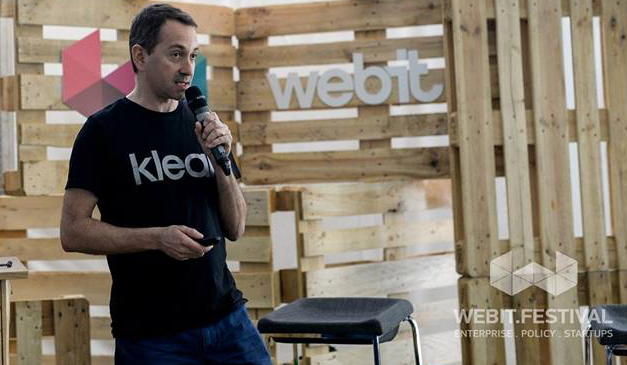Like it or not we are all living in a consumer society which fosters spending. Subject to this we often end up having more things in our closets than money in our bank accounts. Truth is that you will either tell your money what to do or it will always manage you. Budgeting properly personal finances and putting money aside is an everyday challenge for lots of people. That is why I have the pleasure to delve into this adventure with Loic Le Pichoux, ex CEO of BNP Paribas Personal Finance and current co-funder and CEO of KLEAR.

WM: What does management of personal finances mean to you? What are your top five tips for managing personal finances?
Loic Le Pichoux: There are many aspects of managing personal finances. However, there is one that stands out, namely balancing of the monthly budget. A balanced budget means that at the end of the month your expenses are lower or at least not higher than your incomes. This rule applies regardless of your income class. Other aspects may include knowing how to invest, how to manage your debt, how to cut on expenses or increase your income. Management of personal finances is a vast field and unfortunately something that is not taught at school.
If I must bring PFM down to five tips, naturally my number one would be making sure that every month you do not spend more than you earn. This could be easily achieved by registering and analysing one’s spending.
My second tip would be setting aside monthly an amount in order to build a buffer for unpredictable expenses. These happen so often that they could, in fact, be easily predicted. The buffer will ensure that your monthly budget is balanced. Ideally you should grow your buffer to at least 6 salaries but in reality, even a buffer of 1000 EUR can in most cases save you from financial trouble.
Tip Three: avoid taking debt. Mortgage can be an exception here but even then, think twice if renting out would not be a better option. Renting out offers mobility. It also frees funds for investments.
Tip Four and Five: Start thinking about your retirement now. Due to aging population it is highly probable that governments will not be able to sustain us in the way they currently support our parents. A long-term financial and investment plan is therefore a must.
WM: Lots of us struggle with saving money. Often because we do not keep clear track of our money, because we engage in impulsive purchases and the kind. How can we turn saving into mission possible?
Loic Le Pichoux: Spending is in our nature but sometimes we need to find a way to resist our whims and desires.
There are many techniques that can help you avoid reckless spending. The most popular one is paying yourself first, i.e. transferring a certain amount of money to a saving account as soon as the salary arrives. Others include destroying your credit card or avoiding keeping money in a jar as it is easily spent. Then there are hundreds of anti-shopping tips, number one being: Do not visit the mall ☺
Though, these quick fixes will not work if you are not sticking to your monthly budget, which also sets the limits to your spending. The good news is that diligent financial planning and long-term goals will start paying off sooner than expected.

WM: Often when people need quick cash they turn to bank and other financial institutions. What alternatives are available on the market and what makes them more feasible than the mainstream ones?
Loic Le Pichoux: This question itself contains some of the key misconceptions people have about taking credits in general.
First, we need to come back to personal finance fundamentals. Why do you need quick cash? Did your car break down? That is what cars do. Most events that happen in our life are rather predictable. Children always go to school in September; Christmas is always celebrated in December. So, plan for them! In addition, by having a proper insurance one can mitigate most of the big financial calamities. Therefore, needing “quick cash” often is an indication of poor personal finance management. So even if you manage to borrow it from a fast-loan company, it will be very expensive.
P2P lending platforms are similar to mainstream financial institutions in a way, that we too try to avoid lending cash for urgent needs. Our mission at KLEAR is to help people finance meaningful projects, such as purchasing a new car or home renovation. We lend to people with a good credit history and a stable household budgets, and we offer them an interest rate between 5.7% and 14%. Lending to this segment of low-risk customers represents 90% of the borrowers’ market. This is also why most of our clients receive an interest of 5.7% on their investments. However, we usually do not offer quick cash.

WM: Keeping money in a bank is a widely known but definitely not the most profitable practice. If we have some spare money how we can use it wisely in order to gain some extra benefit out of it?
Loic Le Pichoux: Keeping money in a bank is exactly what it is – keeping it. In fact, inflation could even depreciate the value of your money. At the same time banks use your money and makes a hefty margin of 10-11% when lending it to other people.
Instead of simply “keeping” it, you could put your money into use. You could buy shares in companies, investment funds, properties or debt instruments, such as government or corporate bonds; or you could invest in loans of individual borrowers. If you want to learn more about the pros and cons of each instrument, you can have a look at the free investment guide published on KLEAR website. It is free to use here.
Investing is not that difficult at the end. There are two golden rules:
- Spread your investments among many asset classes and instruments. In other words, “do not put all your eggs in one basket”;
- Invest regularly even if it must be in small amounts. In the long term this will help you reach an average return.
As a founder of KLEAR I would recommend that everyone includes portfolio of individual borrower’s loans in their investment mix. The average return for our investors in the past year was 6.7% with a remarkably low loss risk.

WM: Bitcoin and other crypto currencies have become popular during the past few years due to enormous profit margins. What is your opinion on crypto currencies and the risk associated with it?
Loic Le Pichoux: The idea of crypto currencies is very seductive and attracted attention from the segment of geeks and tech guys. I got interested in and purchased some, to taste it. Very small amount indeed.
And then I witnessed the crazy evolution of the Bitcoin price, which culminated at the end of 2017. Everybody was talking about Bitcoin, including the taxi drivers… Well, when such a thing happens, you know that it’s time to back off.
What’s happening looks very much like a bubble, like the dotcom bubble in 2000…
Buying crypto currencies is not investing. It’s like gambling or trading on extremely volatile assets. You can earn a lot or lose everything…
Definitely, it’s not something where you should put the money you saved for your future plans…
Only the money you agree to lose!
WM: You let go of your successful career in banking in order to set up a start-up in the same field that is now yielding greater and greater recognition and popularity. What does it take to make such a step and how has your life changed thereafter?
Loic Le Pichoux: To start a company, you need to be the adventurous type and to like risk. Our dream was to change the way customers were treated by financial institutions and to create a safe place for people to interact with finance. We followed it. There was nothing poetic about it but it felt like the only natural thing to do.
We had successes and failures of course. That’s life. But it’s impacting you much more than when you work in a corporation. I believe any founder of a venture experiences it. You need to smooth your emotions, keeping a cold head during the highs and being resilient during the lows…
 I am Loic Le Pichoux, co-funder and CEO of KLEAR LENDING AD. I think the most important thing in life is trust. At work you succeed if you trust your peers and if you gain their trust. That’s pretty much the same in your personal life.
I am Loic Le Pichoux, co-funder and CEO of KLEAR LENDING AD. I think the most important thing in life is trust. At work you succeed if you trust your peers and if you gain their trust. That’s pretty much the same in your personal life.
I’ve been working in the financial industry for more than 20 years in various positions and countries. Every day, I keep discovering something or having a new idea. That’s what keeps me excited!






